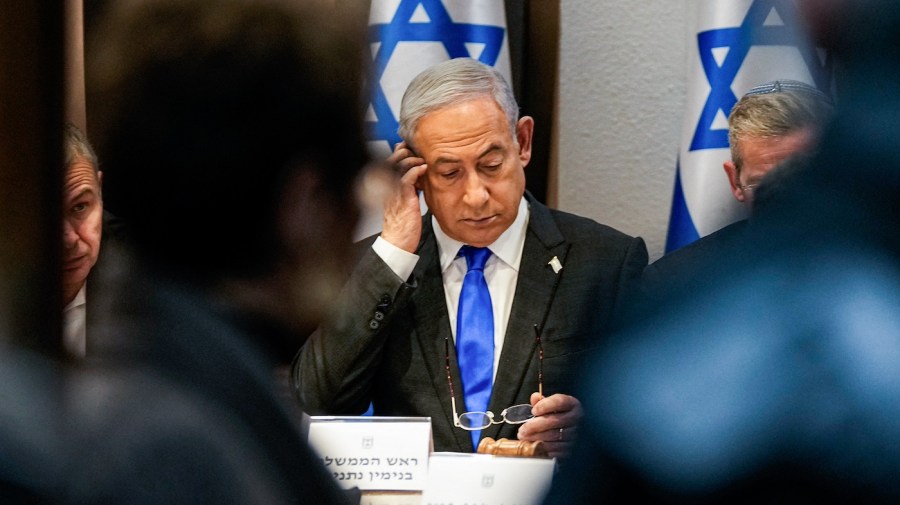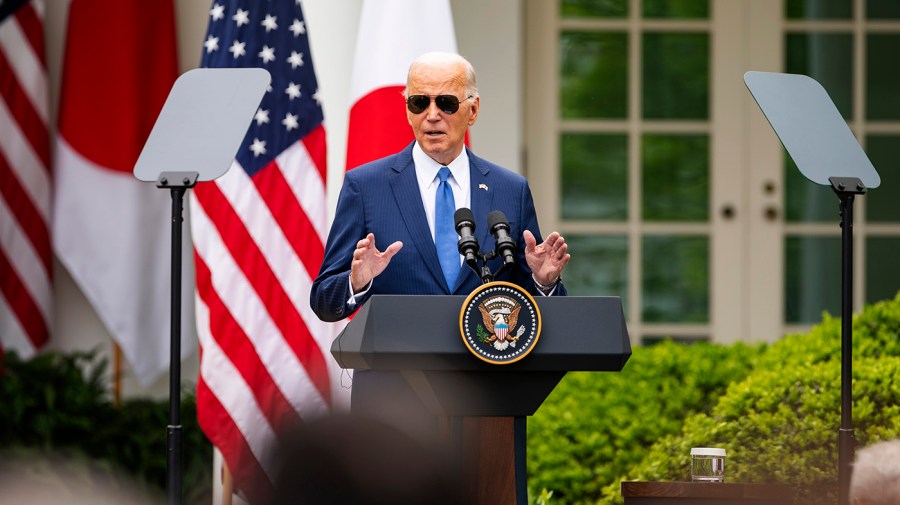Walls close in on Netanyahu over Rafah invasion
The walls are closing in around Israeli Prime Minister Benjamin Netanyahu, who is facing immense pressure from the U.S. to avoid a civilian catastrophe in Gaza’s southern city of Rafah but is also under threat from far-right members of his coalition, who want a decisive offensive against Hamas in its final stronghold.
Netanyahu has projected strength throughout the war but is often risk-averse and indecisive when it comes to high-stakes decisions, such as launching costly military operations, according to insiders and long-time Israel watchers.
The Israeli leader appears to be biding time, despite Israel indicating in February that it would invade Rafah if all Israeli hostages weren’t returned by the start of Ramadan on March 10. Netanyahu said this week that a date for an Israeli offensive on Rafah has now been set, but both U.S. and Israeli officials said they have not been clued in on a timetable.
“It’s a pickle,” said Jonathan Schanzer, senior vice president for research at the Foundation for Defense of Democracies, a Washington-based think tank.
“We’re at this strange juncture in this war where politics are now beginning to supersede the battlefield, and I don’t think it’s healthy. I think both leaders, Biden and Bibi, are to blame for this. They need to take their disagreements into a private room and hash them out as allies do,” Schanzer continued, referring to Netanyahu by his nickname.

Israel’s Prime Minister Benjamin Netanyahu chairs a cabinet meeting at the Kirya military base, which houses the Israeli Ministry of Defence, in Tel Aviv on December 24, 2023. (Photo by Ohad Zwigenberg / POOL / AFP)
Biden, facing growing pressure within his party to end the suffering of Palestinians, has pushed Netanyahu in recent days to allow for more humanitarian aid to get into Gaza, prioritize protection of civilians in Gaza, and compromise on a six- to eight-week cease-fire agreement with Hamas to allow for a surge of humanitarian support into the Strip.
But any cease-fire deal is divisive in Israel and emboldening criticisms from far-right members of Netanyahu’s coalition, some of whom have threatened toppling the government if an Israeli offensive into Rafah is not carried out.
“If the Prime Minister decides to end the war without an extensive attack on Rafah in order to defeat Hamas, he will not have a mandate to continue serving as Prime Minister,” Israel’s National Security Minister Itamar Ben-Gvir posted Monday on the social platform X.
“Netanyahu, he’s indeed caught in between these two pressures,” said Itamar Rabinovich, a distinguished nonresident fellow with the Brookings Institution and a former Israeli ambassador to the U.S.
Ben-Gvir is part of a grouping of far-right Israeli politicians who agreed to join Netanyahu’s coalition in December 2022. In exchange, Netanyahu gave Ben-Gvir and others prime security portfolios and commitments that he would push through conservative reforms in the judicial system, which drew massive domestic protests and harsh criticisms from Biden and Democratic lawmakers.
The Israeli opposition protest movements were suspended in the aftermath of Hamas’s Oct. 7 attacks against Israel and the subsequent war.

Israel Prime Minister Benjamin Netanyahu greets US President Joe Biden upon his arrival at Tel Aviv’s Ben Gurion airport on October 18, 2023, amid the ongoing battles between Israel and the Palestinian group Hamas. (BRENDAN SMIALOWSKI/AFP via Getty Images)
But the movement has mobilized its infrastructure in recent weeks to protest against Netanyahu’s handling of the war and the fate of the remaining hostages, held by Hamas for six months.
And Israel’s opposition politicians are putting out calls for new elections to take place in September, threatening to disband the emergency wartime government amid deepening frustration with Netanyahu’s handling of the war.
“One gets a sense that the coalition can’t hang on forever,” Schanzer said. “In fact it was always going to have to face the music at some point, because of the fact that it was this government that oversaw the greatest intelligence and military collapse in recent memory in Israel.”
Netanyahu and his government have held off on calls to launch investigations into the supreme intelligence and military failures surrounding Hamas’s surprise assault on Israel on Oct. 7 until there’s a conclusion to the war.
This is raising concern among critics that Netanyahu is prioritizing his political survival over ending the war. Netanyahu also faces three separate court trials of wrongdoing, with a corruption trial resuming in December.
“I don’t think that Netanyahu is helping matters by trying to issue appeals to his right-wing base when he needs to fight the war that he was asked to finish,” Schanzer said.
“His primary concern right now should be engaging directly and constructively with the White House to clear a path for the final phase of this war.”
Biden is loath to condition military aid to Israel, saying the U.S. commitment to Israel’s security is “ironclad” in the face of a present, significant, threat of attack from Iran.
But he says Netanyahu must drastically shift course in Gaza and has raised the possibility of unnamed consequences and changes to U.S. policy toward Israel.
“We will see what he does in meeting the commitments he made to me,” Biden said Wednesday.

President Biden speaks during a joint press conference Japanese Prime Minister Kishida Fumio in the Rose Garden of the White House in Washington, D.C., during Kishida’s official state visit on Wednesday, April 10, 2024. (Allison Robbert)
While the U.S. is pushing for a deal that is aimed at securing the release of an estimated 133 hostages, Biden’s most recent remarks indicate a growing emphasis on a short-term cease-fire, even without guarantees that hostages will be released.
“What I’m calling for is for the Israelis to just call for a cease-fire, allow for the next six, eight weeks total access to all food and medicine going into the country,” the president said in an interview with Univision that was broadcast Tuesday.
Hamas has told negotiators that it doesn’t have 40 hostages to release — the number proposed for a first phase of a deal — raising questions over how many hostages are alive and where they are being held.
Part of the Biden administration’s master plan to end Israel’s war against Hamas is to empower the Palestinian Authority in the West Bank to take over governing the Gaza Strip, an outcome that is unacceptable to Netanyahu, but even more so to his coalition partners, Rabinovich said.
Netanyahu, in a meeting with visiting House Republicans last week, criticized efforts to “ram down our throats a Palestinian state.”
“This scheme is not acceptable to Netanyahu or to his partners because they don’t want the Palestinian Authority in Gaza,” Rabinovich said.
“And they threaten Netanyahu, that if he agrees to that, [far-right members] will leave his government — which would mean that his government will fall, there’ll be an election, he’s not doing well with Israeli public opinion, he will lose, he will be out of power, and that’s the last thing on earth he wants to see.”
Still, Netanyahu is seemingly relenting to Biden’s pressure by scaling down the intensity of military operations in Gaza, delaying an offensive on Rafah and allowing for an increase in humanitarian aid into the Strip.
Top Stories from The Hill
- House leadership eyes FISA Plan B after failed floor vote
- Trump faces do-or-die moment with hush money trial
- Arizona abortion ruling creates new dangers for Republicans
- Senate Democrats ‘baffled’ by calls for Sotomayor to step aside
Rabinovich said in his assessment, Israel’s effort to defeat Hamas has been successful, dismantling its military infrastructure, degrading its ability to launch attacks, and killing an estimated 13,000 fighters with the group.
But Israel has not destroyed it, Rabinovitch pointed out, with Hamas’s political movement and ability to govern intact. Its top leaders in Gaza also remain alive and in hiding.
And Hamas is viewed as having little incentive to agree to release hostages in exchange for a cease-fire, believing it can outwait U.S. support for Israel amid global isolation over the scale of death and destruction against Palestinians.
“From my point of view, the most important thing for Israel to do now is to worry about what is known as ‘the day after.’ If you do not want Hamas there, you have to make sure that there is an alternative entity,” Rabinovich said. “And I’m one of those who do not see an alternative entity but the [Palestinian Authority], with all its problems.”
Copyright 2023 Nexstar Media Inc. All rights reserved. This material may not be published, broadcast, rewritten, or redistributed. Regular the hill posts











